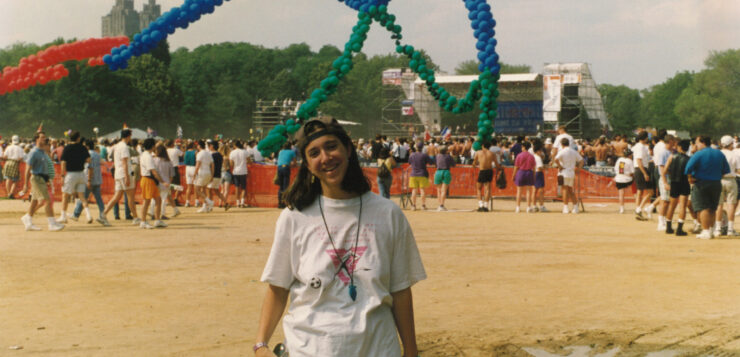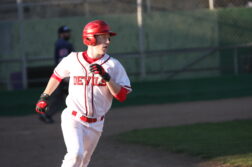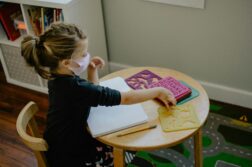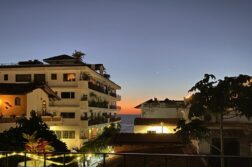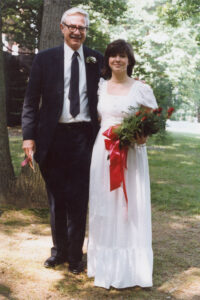
As a kid, I had only the vaguest notion that my dad was a spy. When I was ten, he told me he worked for the Pentagon, which seemed fine. But then his story changed and he said he worked for the State Department, which later became the Department of Defense. His revolving door of job titles left me with a permanent fog about his occupation and whether or not I could trust him. It was a shadowy thing, this undisclosed secret. It was a family pact, too. According to the “spy family code,” we weren’t supposed to talk about it, ever–whatever ‘it’ was. It’s only now that I realized this fog about my dad’s job was similar to the fog I felt about my sexuality.
I knew intuitively not to talk about the fact that I preferred girls to boys. But when I was called a “lezzie” by a boy on the school bus, it was really clear: it was bad to be the way I was. My queerness only went further underground. I doubled down on hiding, and stayed that way until college.
In the middle of a women’s studies lecture about lesbian poets, a student with short spiky hair who wore black Doc Marten boots announced to the class that she was gay. Just like that. It was 1984, and the room went completely silent. The professor invited the class to an informal post-lecture discussion about sexuality at a nearby pub. I convinced myself it was “research” and decided to go.
I showed up at the bar wearing my signature experimental garb: a black-and-white polka-dotted skirt, and a wool WWII nurse’s cape from the Army Navy store. I spotted the woman with spiky hair talking to two other women at a corner table. My palms sweat. Where was everyone?
The woman smiled when I sat down.
A moment later, our professor showed up, and one of the students said, “I wish more straight women had come.” Everyone agreed. No one looked at me like as a straight woman, as if I might be anything else but gay. They saw me as part of a club I wasn’t ready to be included in. I stared at the layer of foam on my beer and tried to follow the discussion, but all I heard was the panic ringing inside my head. Was I gay? How could I be sure? All I felt was afraid and confused.
After graduating, I found an apartment in one of Boston’s “student” neighborhoods. Not long after, I found my way into the city’s feminist community, which gave me the courage to finally come out to my dad. I did it in a letter. He called when he received it, and said it wasn’t natural and that he couldn’t accept “it.” Hearing this made me sweaty and sick.
“But we don’t have to lose contact,” he added, in a last-ditch effort.
I went right back into the closet with him for years after that. Not to the rest of the world, just to him. In Boston, I threw myself into a super queer life. I went to Pride, joined a feminist radio collective full of lesbians, and played on a women’s soccer team full of the same. But none of it did I share with my father.
I was out as queer, but not as a spy daughter.
I learned my dad was a spy not from him, but from a stranger. A guard made me sign a form saying I wouldn’t disclose the fact that I was about to live on a CIA base. It was the summer between my sophomore and junior year. It was startling to be told, even though I had long suspected it. I can still feel the jolt of remembering this moment, the way he said it, like it was an ordinary word like lawnmower or soap.
In many ways, it was harder to come out as a spy daughter than to come out as queer. It wasn’t until I was in my forties that I was ready to do it, which I did by publishing an essay. After it ran, I was contacted by a host of other adult kids of spies. Dozens of messages landed in my inbox. There was a breathless quality as if there wasn’t enough time to say what needed saying.
“Me, too. My dad was a spy,” they said.
One man wrote, “The secret we carry is bigger than us.”
He told me he felt responsible for keeping his father’s secret, and he could never do what I did. His dad could be killed if his identity were revealed. He warned me not to use his name in anything I wrote. He seemed to disapprove of my piece but then added, “It’s good to see my life on the page.”
Another man sent a recording of the theme song from The Spy Who Loved Me. He said he plays it often and that listening to it allows him to feel connected to his father. He said his father never opened up to him about his work. I pressed play and listened to the sweeping arrangement, a song I used to make fun of. Today, it sounded like a sweet, loving tribute. But it saddened me, too, to think that there was no other public way for him to honor his father and their connection except a theme song from a film franchise that glorified spydom. But I understood. Just like queers, spy families are invisible. Intentionally so.
A woman wrote to me and said, “I used to tell people what my father did, but people reacted with argument or stony silence. I don’t tell anyone anymore.”
I understand all too well, the way the word “queer” or “CIA” can stop conversations. Still, risking the truth of who I am is worth it–no matter how many closets I find myself in.
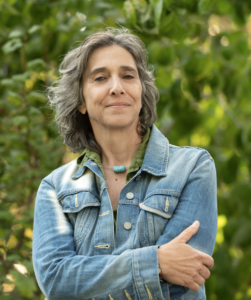 Leslie Absher is a journalist and essayist. Her work has appeared in the New York Times, Los Angeles Times, Independent, Salon, Huffington Post, Ms., and the San Francisco Chronicle. Her father joined the CIA before she was born. When she was a baby, her family moved to Athens, Greece. Just in time for a coup. She spent years trying to learn what her Cold War father’s role was in that event. Her memoir Spy Daughter, Queer Girl is about growing up with a spy and the cost of keeping secrets. Leslie taught G.E.D. to high school dropouts and currently teaches writing and study skills to middle school and high school students. She lives in Oakland with her comic book writer/lawyer wife. You can follow her work here.
Leslie Absher is a journalist and essayist. Her work has appeared in the New York Times, Los Angeles Times, Independent, Salon, Huffington Post, Ms., and the San Francisco Chronicle. Her father joined the CIA before she was born. When she was a baby, her family moved to Athens, Greece. Just in time for a coup. She spent years trying to learn what her Cold War father’s role was in that event. Her memoir Spy Daughter, Queer Girl is about growing up with a spy and the cost of keeping secrets. Leslie taught G.E.D. to high school dropouts and currently teaches writing and study skills to middle school and high school students. She lives in Oakland with her comic book writer/lawyer wife. You can follow her work here.


